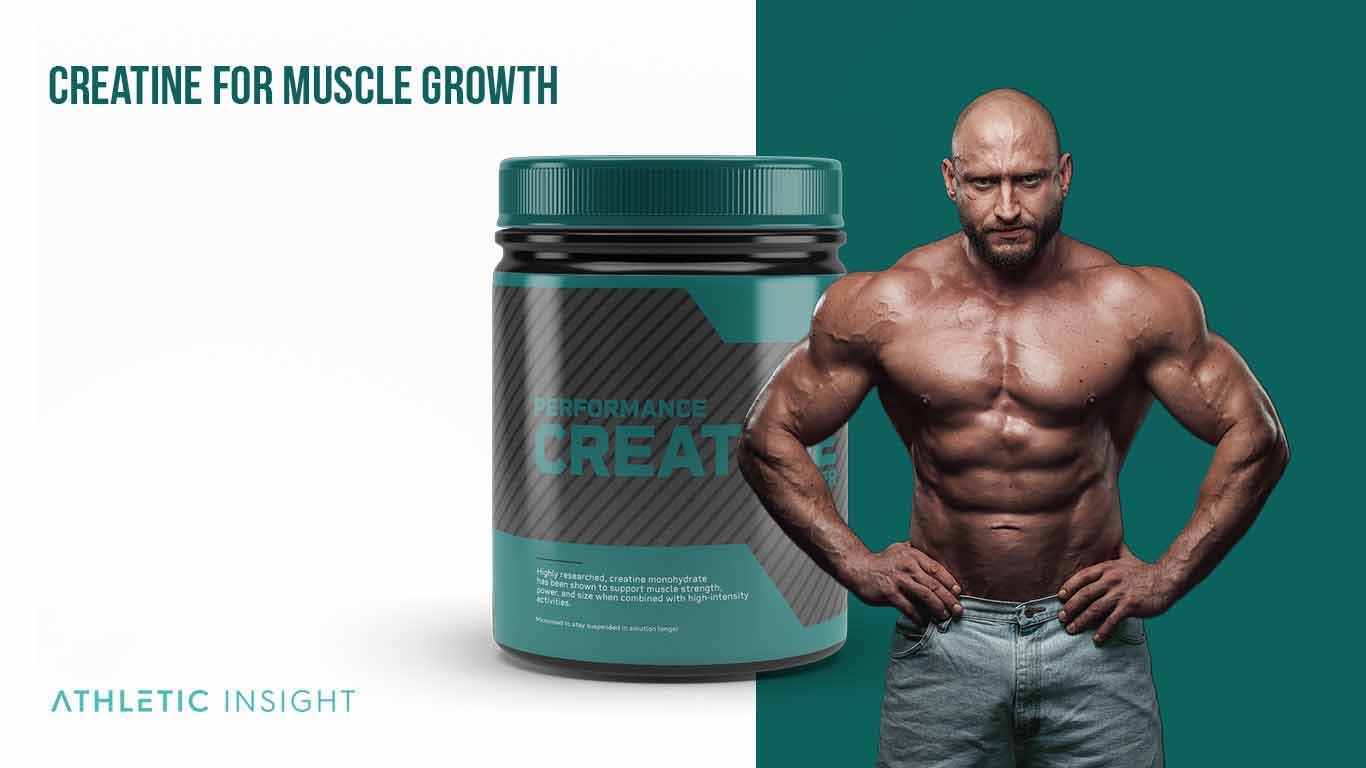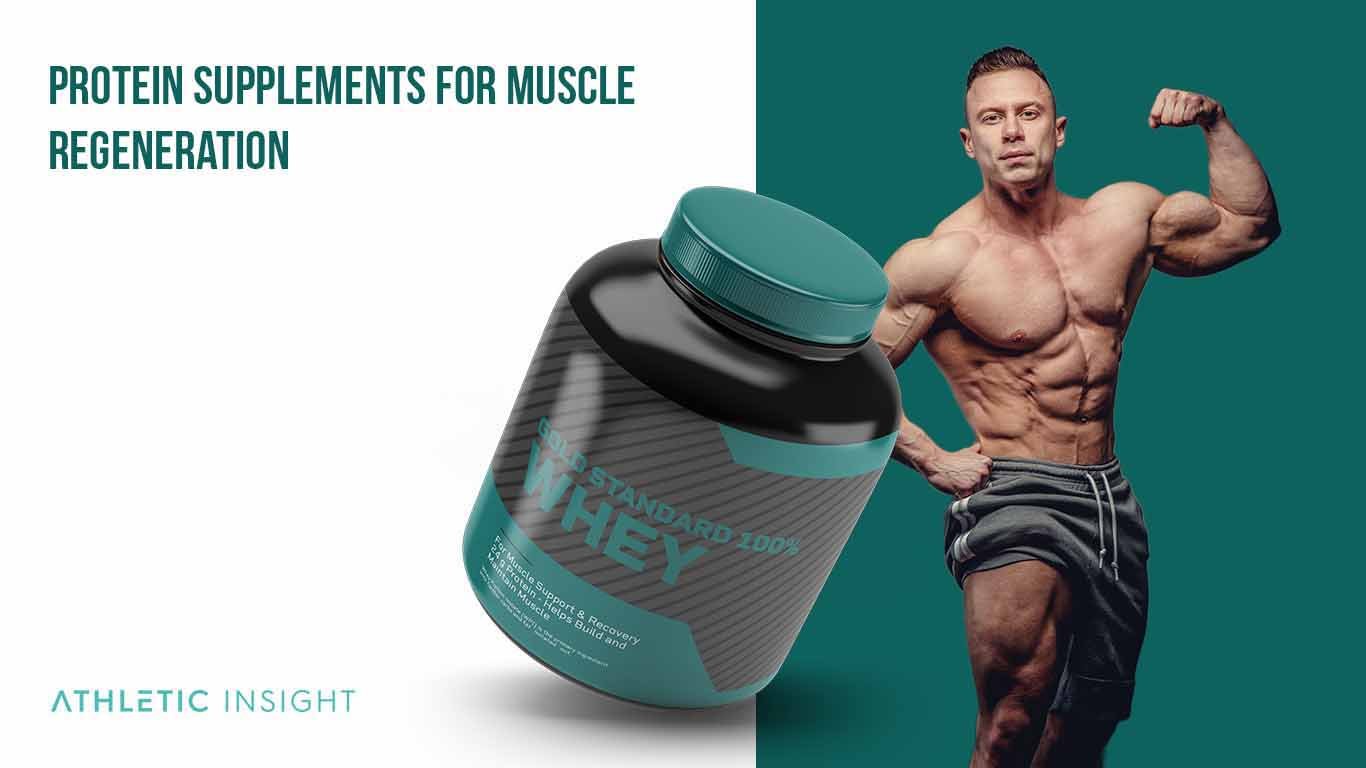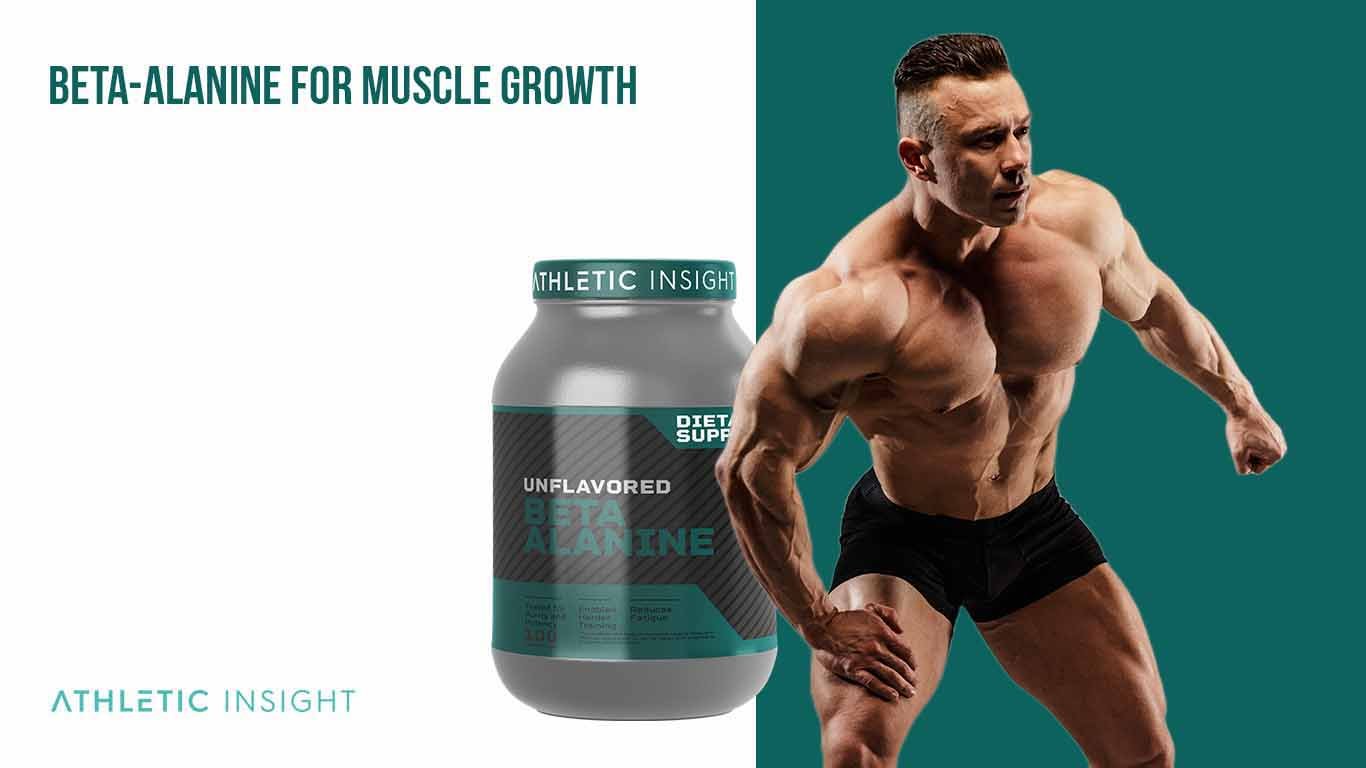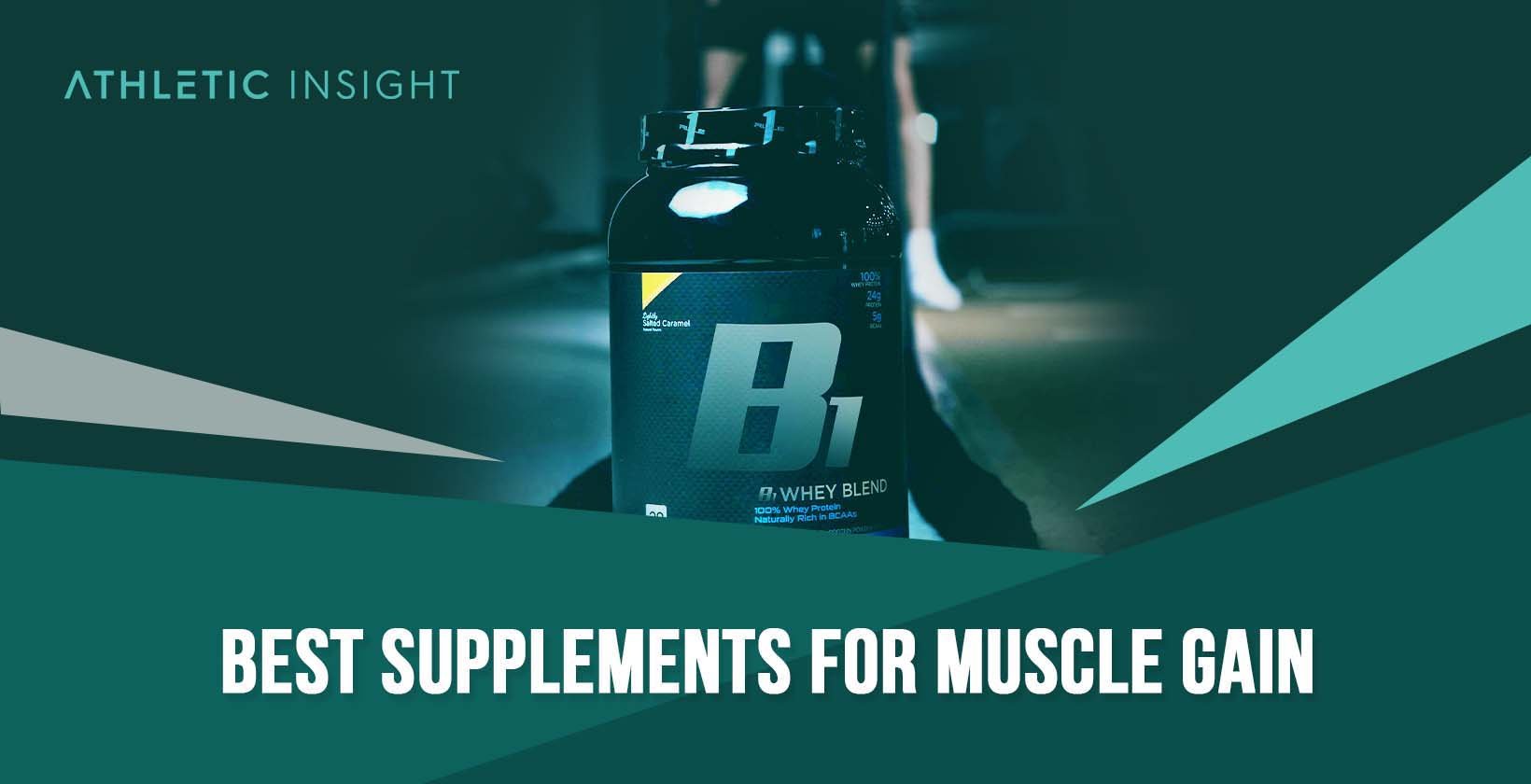Whether you are looking to grow your muscles, increase strength, or improve muscle endurance, the supplements you take while training play a major role. Simply put, the best supplements to gain muscle mass, strength, and endurance are creatine, protein, and amino acids.
While there are many other supplements for strength, hypertrophy, and muscular endurance, these three are most essential. Additionally, human growth hormones and recovery are vital components for all three objectives. Luckily, sleep is not only free, but it is the number one ingredient that you can supplement with to experience both growth hormones and overall recovery.
Athletic Insight Top 5 Products
- Creatine >>> Best Overall Creatine Option
- HMB >>> Best HMB Supplement Available
- Protein >>> Best Overall Protein Powder
- BCAAs >>> Best Overall BCAA Option
- Testosterone >>> Best Testosterone Choice
Depending on your exact goals and your current body type, usage of these supplements will vary from person to person. For more information on best practices, check out the sections below. Be sure to consult with professionals if you have any questions.
1. Creatine for Muscle Growth
The International Society of Sports Nutrition (ISSN) states that creatine is the most effective supplement for athletes looking to gain muscle while working out.

According to a study published in the National Library of Medicine, creatine has been proven to “increase strength, fat-free mass, and muscle morphology” with regular heavy resistance training, high-intensity sprints, or endurance training.
Creatine can help your muscle cells produce more energy, speed up muscle growth, and improve your high-intensity exercise performance. Some scientists think it may be able to minimize the effects of Parkinson’s and other neurological diseases.
While there is no scientific evidence to show that creatine supplements have harmful side effects on healthy people, the ISSN stated that they couldn’t guarantee that there were no bad side effects after long-term use.
The ISSN recommends taking roughly 0.3 grams of creatine a day for three days, then 3 to 5 grams after that. You can also take smaller amounts over a few weeks, but there is less scientific evidence to support this method.
Not only is creatine the single most important supplement that you can take, but it is also inexpensive. You can buy creatine capsules or powder for $0.25 to $0.33 per serving. Here are some brands to consider.
- Thorne Creatine – At just over $30 for 90 servings, this powder creatine supplement is unflavored and contains 5 grams of creatine per serving. It has no gluten, soy, yeast, or other major allergens. It is NSF Certified for Sport, which means it’s passed strict quality standards.
- Klean Athlete Klean Creatine – At just over $52 for 60 servings, this powder creatine supplement is unflavored and contains 5 grams of creatine per serving. It is also NSF Certified for Sport.
- Nutricost Creatine Monohydrate Powder – At just under $30 for 100 servings, this powder creatine supplement contains 5 grams of creatine per serving and comes in unflavored fruit punch or blue raspberry. It doesn’t have any GMOs or gluten, and it’s made in a GMP-certified facility, which means it’s passed quality standards from the Food and Drug Administration.
2. HMB for Muscle Gain
There’s an essential amino acid called leucine that our bodies do not produce naturally, but we can get it through different foods like meat, fish, and milk. When our bodies consume leucine, we can metabolize something called Beta-hydroxy-beta-methyl-butyrate (HMB).
Our muscles can grow faster if protein breaks down slower, and HMB helps keep protein levels high. This can help support muscle growth. What is even more important is that there have been no reported side effects of HMB supplements when taken correctly.
The ISSN recommends taking HMB about an hour before exercising or two hours before if you take it with glucose. However, if you work out first thing in the morning, you can take the supplement immediately before exercising.
HMB comes in powder and pill form, and you can buy HMB capsules or powder for about $30 to $60. Here are some brands to consider.
- Nutricost HMB Supplement – At just under $18 for 250 servings, this powder HMB supplement is unflavored and contains 1000mg of HMB per serving. It does not contain GMOs and is made in a GMP-certified facility.
- Bulk Supplements HMB Supplement – At just over $15 for 250 servings, this powder HMB supplement is unflavored and contains 1000mg of HMB per serving. It does not contain dairy, soy, yeast, or gluten.
- Optimum Nutrition HMB Supplement – At just over $35 for 90 servings, this capsule HMB supplement contains 1 gram of HMB per serving, and you can take up to three a day. The capsules are unflavored.
3. Protein Supplements for Muscle Regeneration
Protein supplements are one of the more common supplements for gaining and regenerating muscle. It helps to increase your muscle protein synthesis or the process of building muscle, and many people take protein supplements to make up for any protein they lack in their diet.

The ISSN recommends consuming about 1.4 to 2 grams of protein per kilogram of your body weight per day, as long as you’re exercising. If you regularly do resistance training, you may want to take more than 3 grams of protein per kilogram of your body weight per day to boost fat loss.
There are many protein supplements on the market, but it is commonly recommended that you look for one that contains all nine essential amino acids (EAAs). Some more common options are whey protein, soy protein, and casein protein.
Whey protein can be digested easily and contains all nine EAAs. Soy protein is a great plant-based option and is considered to be just as effective as whey protein powder when it comes to building muscle. Casein protein is digested more slowly and can help stimulate muscle growth overnight if you take it before bed.
There typically aren’t many side effects reported for protein supplements, but taking too much can cause gastrointestinal discomfort or acne. Protein supplements typically come in powder form, and you can buy them at about $1 per serving. Here are some brands to consider.
- Momentous Essential Grass-Fed Whey Protein – At just under $54 for 24 servings, this powder protein supplement comes in chocolate or vanilla and contains 26.5 grams of protein per serving. It is gluten-free, has no added sugars, and is NSF Certified for Sport.
- BulkSupplements Soy Protein Isolate Powder – At just over $20 for 30 servings, this powder protein supplement is unflavored and contains 27 grams of protein per serving. It is derived from soybeans and is gluten-free.
- Ascent Native Fuel Micellar Casein – At just under $40 for 25 servings, this powder protein supplement comes in chocolate, vanilla, or chocolate peanut butter, containing 36 grams of protein per serving. Ascent claims to process Grade A milk in its facility instead of buying pre-processed protein.
4. Branched-Chain Amino Acids Supplements for Muscle Repair
There are thousands of proteins in the human body, consisting of 20 different amino acids. Of those 20, nine are considered essential; of those nine, there are three branched-chain amino acids (BCAAs): leucine, isoleucine, and valine.
You can typically find BCAAs in protein-heavy foods like eggs, meat, and dairy. They can help build muscle but usually need to work alongside the other six essential amino acids for the best results. Research shows that BCAAs can help keep your muscles from getting sore after a workout which is why most pre and post-workout supplements include BCAAs.
Some possible side effects of BCAA supplements include fatigue, loss of coordination, and gastrointestinal discomfort. For that reason, it is important to follow the instructions on the label and buy from a trusted source.
BCAA protein supplements usually come in powder form, and you can buy them for about $25 to $60. It ends up costing around $1 per serving, which is cheaper than consuming the food required to achieve the amount of BCAA’s that are recommended. Here are some brands to consider.
- Thorne Amino Complex – At just under $39 for 30 servings, this powder BCAA supplement comes in lemon or berry flavors and contains 7.7 grams of BCAA per serving. It is sweetened with Stevia, and it does not contain gluten, soy, or dairy. It is also NSF Certified for Sport.
- Designs for Health BCAA Powder with L-glutamine – At just over $55 for 30 servings, this powder BCAA supplement is orange flavored and contains 9 grams of BCAA per serving. It is sweetened with Stevia and doesn’t contain gluten or soy.
- Klean Athlete BCAA + Peak ATP – At just under $54 for 30 servings, this powder BCAA supplement is orange flavored and contains 8.6 grams of BCAA per serving. It is described as a great pre-workout option, and it doesn’t contain GMOs, wheat, or gluten. It is also NSF Certified for Sport.
5. Beta-Alanine for Muscle Growth
Beta-alanine is an amino acid, but it’s not one of the nine essential amino acids. Beta-Alanine works with histidine to produce carnosine, which is stored in your skeletal muscles and reduces how much lactic acid your muscles accumulate during a workout.

Your muscles naturally have high levels of histidine and low levels of beta-alanine, so taking beta-alanine supplements can help increase muscle growth.
Research has shown that you may even see a difference in as little as three weeks and that beta-alanine can help you work out for longer before you get too tired. The ISSN recommends taking 2 to 5 grams of beta-alanine daily.
The main side effect people have reported from beta-alanine supplements is tingling, but you can avoid that by lowering your dosage.
Beta-alanine supplements typically come in powder form, and you can find them for $20 to $50. Some brands to consider are as follows.
- Swolverine Carnosyn Beta-Alanine – At just under $55 for 60 servings, this powder beta-alanine supplement is unflavored and contains 5 grams of beta-alanine per serving. It does not have any additives, fillers, or preservatives.
- Transparent Labs BULK – At just under $50 for 30 servings, this powder beta-alanine supplement comes in sour grape, watermelon, green apple, orange, blue raspberry, strawberry lemonade, tropical punch, lemon-lime, black cherry, and peach mango flavors, and it contains 4 grams of beta-alanine per serving. It also has 210mg of caffeine, making it a great pre-workout option.
- Neoforce Performance Creaforce – At just under $30 for 60 servings, this powder beta-alanine supplement comes in unflavored, watermelon, blue raspberry, and sour apple, which contains 1,600mg of beta-alanine per serving.
6. Weight Gainers for Muscle Building
You have to consume more calories than you burn in a day to gain weight. However, some people need supplements to help them reach that goal, especially if you are trying to save money or time.
So, how can that help with building muscle? Simple. These supplements are full of the macros needed to support muscle growth. While protein supplements mainly only have protein within, a weight gainer will also consist of a proportional amount of fat and carbohydrates.
There are many possible side effects to weight gainer supplements, though, including an increased risk of diabetes, liver damage, kidney damage, and gastrointestinal discomfort.
Weight gainer supplements typically come in powder form, and you can get them for $30 to $80. Like protein, it typically costs around $1 per serving, which is cheaper and healthier than just eating fast food. Here are some brands to check out.
- Transparent Labs Mass Gainer – At just under $70 for 15 servings, this powder weight gainer supplement comes in sweet vanilla or chocolate glazed donut flavors and contains around 53 grams of whey protein and carb sources, including tapioca, oat, and sweet potato per serving. It does not contain artificial flavors or colors or GMOs, and it is flavored with stevia and monk fruit.
- True Athlete Natural Gainer – At just under $50 for 16 servings, this powder weight gainer supplement comes in vanilla or chocolate and contains 70 grams of carbs per serving. It is sweetened with stevia and monk fruit and is also NSF Certified for Sport.
- Rival Nutrition Clean Gainer – At just over $50 for 15 servings, this powder weight gainer supplement comes in chocolate fudge, soft serve vanilla, cookies and cream, chocolate peanut butter, cinnamon toast cereal, and campfire smores flavors, and it contains 560 calories and 30 grams of protein per serving. It is sweetened with sucralose and stevia leaf extract.
7. Conjugated Linoleic Acid (CLA) for Clean Muscle Gaining
Conjugated linoleic acid (CLA) is an omega-6 fatty acid found in meat, dairy, and vegetable oils that’s beneficial for weight loss. Not only can CLA’s help build muscle, but it can also increase your lean body mass and improve athletic performance.
Supplements provide much higher amounts of CLA than people typically get from natural foods, which can increase your risk of diabetes and cause gastrointestinal discomfort. For that reason, following the instructions on the label is recommended.
Experts recommend taking 3 to 6 grams of CLA a day. Just keep in mind that your risk of side effects increases as your CLA supplement dosage increases. Talking with a professional is highly recommended if you have any questions or concerns.
Lastly, CLA supplements typically come in capsule form, and you can get them for $15 to $40, or around $0.50 per recommended serving. Here are some brands to consider.
- MRM Nutrition CLA 1250 – At just under $27 for 60 servings, this soft gel CLA supplement contains 1000mg of CLA per serving.
- BulkSupplements CLA Softgels – At just under $20 for 300 softgels, this softgel CLA supplement contains 1589mg of CLA per serving.
- NOW Foods CLA – At just under $23 for 60 servings, this soft gel CLA supplement contains 800mg of CLA per serving.
8. Testosterone Boosters for Faster Muscle Growth
Many people think of testosterone boosters as just a male sex hormone, but testosterone is found in both men and women and aids with various things in the body, including muscle growth.
Testosterone levels naturally fall over time, so many people decide to use supplements to help. Most testosterone boosters contain HMB and creatine, which both help encourage muscle growth.
Testosterone boosters have many known side effects, including hair loss, male breast enlargement, acne, increased aggression, and even infertility. It is highly advised that you discuss taking testosterone booster supplements with your doctor beforehand.
Testosterone boosters typically come in powder form, and you can buy them for $45 to $65. The price per serving comes out to around $0.05 to $0.10 per serving, which is quite affordable. Here are some brands to consider.
- Nature Made Vitamin D3 – At just over $18 for 400 servings, this supplement contains 50mcg of vitamin D3 per serving. Research has shown that low vitamin D3 can result in lower testosterone levels.
- NOW Foods Fenugreek – At just under $13 for 125 servings, this supplement contains 500mg of fenugreek per serving. Research has shown that fenugreek can help boost testosterone levels.
- Bulk Supplements Saw Palmetto Extract – At just under $14 for 100 servings, this supplement contains 320mg of saw palmetto extract per serving. Research has shown that saw palmetto extract might boost testosterone levels.
What Are the Benefits of Using Supplements on Muscle?
Suzanne Smith, a certified sports dietician at UC San Diego Health who helps athletes determine appropriate supplement use, told the school that supplements can help boost performance but added that a good diet is also important.
“There’s a fair amount of research showing that supplements such as creatine can improve performance and muscle strength during high intensity, short interval exercise,” Smith said.
Smith said supplements might not be worth it for people who only work out a couple of times a week, but they can be helpful for athletes looking to improve recovery, speed, and strength leading up to a competition.
She added that you should use the supplements to meet a goal, then stop them when you reach your goal instead of using them long-term.
How Should You Use Supplements for Effective Muscle Gain?
You need to consider a few things when deciding how to implement supplements into your workout routine. According to Doctor Andrew Huberman of Stanford, Creatine is the single most important supplement a person should consider.
When is the Best Time to Use Supplements for Muscle Gain?
The best time to use a supplement depends on the type of supplements you’re taking.
For example, research shows that it is best to take creatine supplements close to your workout. You can either take all of it after your workout or split the dose and take half beforehand and half afterward.
It is commonly recommended that you take HMB supplements about an hour before your workout – unless you work out first thing in the morning, then you can take the supplement immediately before you exercise.
The ISSN recommends taking protein supplements up to two hours after a workout, but within 30 minutes is most optimal for uptake.
Lastly, always consult your doctor before adding any supplements to your routine, and adhere to the directions on the packaging.
Can a Supplement Help For Muscle Gain and Weight Loss at the Same Time?
Yes, you can supplement for muscle gain and weight loss at the same time. Some supplements, like protein, are great for weight loss.
Can Supplements for Muscle Gain Help to Lose Weight?
Yes, supplements for muscle gain can help lose weight. Protein boosts your metabolism and lowers your appetite, which helps your body break down food more efficiently. At the same time, weight loss supplements can help with muscle gain if you take it shortly after a workout.
Is Using Supplements For Strength and Muscle Gaining Healthy?
Yes, supplements are healthy for strength and muscle gaining. Supplements should be perfectly healthy if you use the correct dosages and consult your doctor before taking them.
What Are the Other Types of Best Supplements For Different Groups and Purposes?
There are tons of different supplements on the market, but it’s important to consider things like age, gender, and health status when deciding which option is right for you.
What Are the Best Supplements for Women?
Navigating the health and fitness field can be difficult for women when the majority of the information is catered for men. If you are a woman looking for the best supplements you should take protein, creatine, and BCAAs. These are three of the best supplements for women.
Protein supplements can help you gain muscle more quickly, and it works great if you take half of it before your workout and half of it right after. While your macros are dependent upon your goals, most women do not hit the daily recommended amount of protein.
Creatine helps boost your endurance and power you through high-intensity workouts. This can help you power through more muscle-building workouts. Like with the protein supplements, try taking half a dose before your workout and half a dose after.
Lastly, BCAAs can help give you an extra boost of energy during your workout and boost muscle growth. Treat it like you would protein and creatine, and take some before and after your workout.
What Are the Best Supplements for Men?
Creatine, protein, and weight gainers are three of the best supplements for men. As mentioned above, protein can help you gain muscle more quickly, and creatine can help power you through high-intensity workouts.
Weight gainers are great for men because they typically struggle with that more than women do. Weight gainers not only help if you’re struggling to keep up with your daily calorie intake but they are also loaded with more protein to help boost muscle growth.
What Are the Best Supplements for Elderly People?
Whey protein is one of the best supplements for elderly people. Many elderly people lose muscle mass as they age, but studies show that whey protein in particular was great at helping them to regain muscle. However, not all proteins are created equal. Whey is one of the highest quality proteins and is ideal for older people.
What Are the Best Supplements for Kids?
You have to be a bit more careful when selecting supplements for kids. Protein is a pretty safe bet, but experts recommend that you avoid protein powder supplements for kids and focus instead on high-protein snacks after a workout. Chocolate milk, meat, or eggs are all good options.
What Are the Best Supplements for Diabetics?
Diabetics can take just about any supplement, as long as they pay attention to the ingredient lists. For protein supplements, Christel Oerum, founder of Diabetes Strong, recommends Met-RX or Isopure. For creatine and BCAA supplements, go with Thorne. All three options are generally low in carbohydrates, making them some of the best supplements for diabetic people to take.
What Are the Best Supplements For Athletes?
Athletes can typically be more aggressive with their supplement intake because they workout so much. Protein, creatine, and beta-alanine are great options for athletes.
Whey protein shakes are a classic athlete drink and for a good reason. The supplement is great for increasing muscle mass, especially if you take it immediately after your workout.
Creatine helps increase lean muscle mass when you do strength training, and it can also increase blood flow to your muscles as you work out and help keep you energized for high-intensity training.
Beta-alanine helps you workout longer before you start to get tired, and it can also increase the effectiveness of creatine. All three are the best supplements for athletes, especially for those that want to stay competitive for many years to come.



